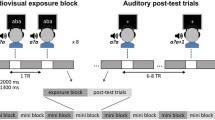Abstract
The performance of poor and normal sixth-grade readers was compared on an auditory short-term memory task in two studies. In the first study, the effects of distraction, list length, and speed of stimulus presentation were investigated to test the hypothesis that the performance of the poor readers is affected by deficits in selective attention. Group differences in performance, however, were obtained for both distraction and no-distraction conditions. The second experiment examined the hypothesis that group differences may reflect differences in the use of rehearsal. In the second experiment, half the reading-disabled children and half the controls were provided with rehearsal training prior to completing the same short-term memory task a second time. Rehearsal training resulted in improved performance relative to children who were not trained; however, there was no rehearsal training x reading group interaction. The poor readers continued to show deficits in performance relative to the performance of control children. The results of these two studies suggest that deficits observed for poor readers on short-term memory tasks may reflect processing difficulties in some area that precedes rehearsal and affects performance under both distraction and no-distraction conditions.
Similar content being viewed by others
References
Bauer, R. H. (1977). Memory pocesses in children with learning disabilities: Evidence for deficient rehearsal.Journal of Experimental Child Psychology, 24, 415–430.
Chapman, L. J., & Chapman, J. P. (1973).Disordered thought in schizophrenia. New York: Appleton-Century-Crofts.
Frank, H. S., & Rabinovitch, M. S. (1974). Auditory short-term memory: Developmental changes in rehearsal.Child Development, 45, 397–407.
Hagen, J. W., & Hale, G. A. (1973). The development of attention in children. In A. Pick (Ed.),Minnesota symposium on child psychology (Vol. 7, pp. 117–140). Minneapolis: University of Minnesota Press.
Hagen, J., Jongeward, R., & Kail, R. (1975). Cognitive perspectives on the development of memory. In H. Reese (Ed.),Advances in child development and behavior (Vol. 10, pp. 57–101). New York: Academic Press.
Hallahan, D. P., Kauffman, J. M., & Ball, D. W. (1973). Selective attention and cognitive tempo of low achieving and high achieving sixth grade males.Perceptual and Motor Skills, 36, 579–583.
Hallahan, D. P., Kauffman, J. M., & Ball, D. W. Developmental trends in recall of central and incidental auditory material.Journal of Experimental Child Psychology, 17, 409–421.
LaBerge, D., & Samuels, S. J. (1974). Toward a theory of automatic information processing in reading.Cognitive Psychology, 6, 293–323.
Lord, F. M. (1967). A paradox in the interpretation of group comparisons.Psychological Bulletin, 68, 304–305.
Lord, F., & Novick, M. (1968).Statistical theories of mental test scores. Reading, Massachusetts: Addison-Wesley.
Pelham, W. E. (1979). Selective attention deficits in poor readers: Dichotic listening, speeded classification, and auditory and visual central and incidental learning tasks.Child Development, 50, 1050–1061.
Pelham, W. E., & Ross, A. O. (1977). Selective attention in children with reading problems: A developmental study of incidental learning.Journal of Abnormal Child Psychology, 5, 1–8.
Ross, A. O. (1976).Psychological aspects of learning disabilities and reading disorders. New York: McGraw-Hill.
Spring, C., & Capps, L. (1974). Encoding speed, rehearsal and probed recall of dyslexic boys.Journal of Educational Psychology 66, 780–786.
Tarver, S. G. Hallahan, D. P., Kauffman, J. M., & Ball, D. W. (1976). Verbal rehearsal and selective attention in children with learning disabilities: A developmental lag.Journal of Experimental Child Psychology, 22, 375–385.
Thorndike, E. L., & Lorge, F. (1944).The teacher's word book of 30,000 words. New York: Columbia University Press.
Torgesen, J. (1977). The role of nonspecific factors in the task performance of learning disabled children: A theoretical assessment.Journal of Learning Disabilities, 10, 33–40.
Torgesen, J., & Goldman, T. Verbal rehearsal and short-term memory in reading disabled children.Child Development,48, 56–60.
Vellutino, F. R. 1977. Alternative conceptualizations of dyslexia: Evidence in support of a verbal-deficit hypothesis.Harvard Education Review, 47, 334–354.
Winer, B. J. (1971).Statistical principles in experimental design. New York: McGraw-Hill.
Author information
Authors and Affiliations
Additional information
The authors wish to express their thanks to the Sachem School District and Betty Gould, Nicholas Opinanate, and Guy Barber for their unlimited cooperation, and to John Neale for very helpful discussions of a number of issues in this paper.
Rights and permissions
About this article
Cite this article
Ford, C.E., Pelham, W.E. & Ross, A.O. Selective attention and rehearsal in the auditory short-term memory task performance of poor and normal readers. J Abnorm Child Psychol 12, 127–141 (1984). https://doi.org/10.1007/BF00913465
Revised:
Issue Date:
DOI: https://doi.org/10.1007/BF00913465



